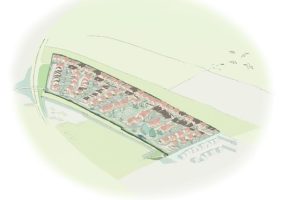Building work delayed as newt population rockets at Monks Cross

CONSTRUCTION work at the £90m Monks Cross retail development on the outskirts of York has been delayed because of a breeding newt population at the site.
Building work on the project was due to start this month, but developers Oakgate said the wet summer had meant a huge rise in newt numbers.
The great crested newt population had grown from nine to 300, said Oakgate, and all the newts would have to be rehomed before building work could start at the site.
The situation has also had a knock on effect for the proposed opening of a John Lewis store at the site. The store was set to open next Christmas but will now open at Easter 2014 at the same time as a Marks and Spencer and a Next store.
Oakgate and contractor Caddick Construction now expect to start work at the scheme in the spring.
Richard France, director of Monks Cross (Oakgate), said: “Naturally, I’m disappointed that work cannot start as early as we would have liked it to. However, as developers, we take our responsibility to the environment seriously and are making sure that all the newts are appropriately rehomed in line with our legal requirements.”
Although the schedule for the construction of the retail development has been hit by the episode, the timeline for the construction of the community stadium, being led by City of York Council, is unaffected, said Mr France.
“Once we get to start, our first task will be to prepare the site for construction, begin building the necessary infrastructure and then to commence building the new retail units, which include the new John Lewis, Marks & Spencer and Next stores,” he added.
Great crested newts are Britain’s largest newt species and the amphibians are protected by law.
Under rules laid out by Natural England – the authority which issues “newt licences” and enforces the species’ protected status – all the great crested newts on the site will have to be individually caught and rehomed to a nearby specially created £300,000 wetland habitat.
Dr Mark Hampton, whose job it is to safeguard the newts during their relocation, said the newts’ breeding prowess was down to one of the wettest summers on record.
“The two males and seven females, which have been found both this year and in previous surveys of newts at the Monks Cross site, have been using trenches dug as part of an archaeological dig in 2005 for breeding,” he said.
“These trenches usually dry up in May and, because newt larvae need wet conditions to survive, this small newt population hasn’t successfully bred before.
“However, because 2012 was the wettest summer in 100 years, the trenches have remained wet and the newts have had an exceptionally successful breeding season.”
Dr Hampton added that the newts were still hibernating and would only emerge to be caught when temperatures increase.








